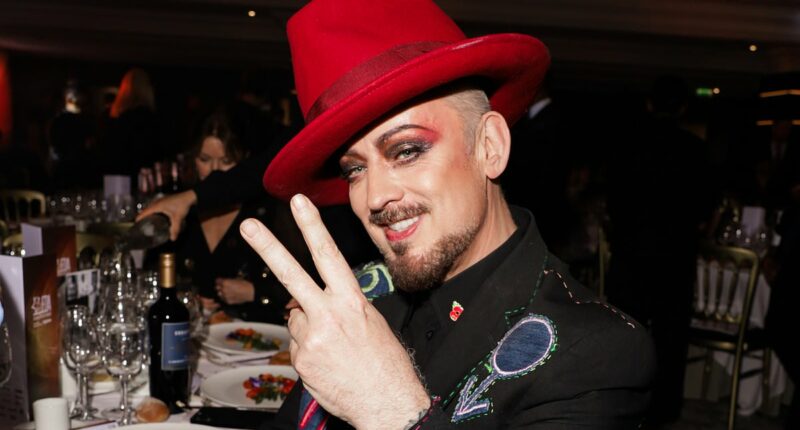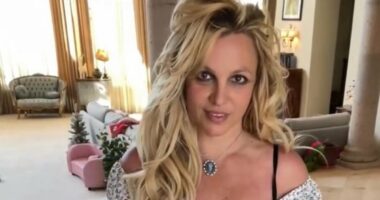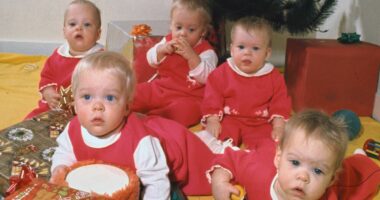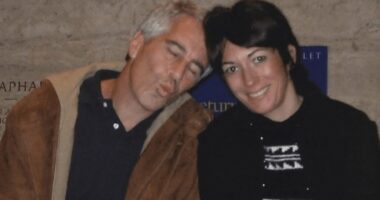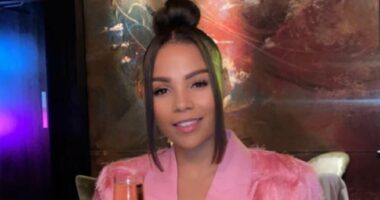Share this @internewscast.com
Boy George has once again clashed with JK Rowling, asserting that the anxiety surrounding encounters with transgender individuals in women’s changing rooms is merely fabricated.
The 64-year-old lead singer of Culture Club has reignited his ongoing dispute with the famous author, who is known for her controversial opinions on gender issues. Rowling has faced backlash from both trans activists and cast members of the Harry Potter films for her views.
Earlier this year, George criticized Rowling, 60, labeling her as a ‘wealthy bored bully.’ This was part of a prolonged disagreement that began in April when George claimed that Rowling couldn’t distinguish between transgender women and biological men.
George, like celebrities Tilda Swinton and Pedro Pascal, has shown his support for the transgender community. Pascal previously referred to Rowling as a ‘heinous loser’ on Instagram.
In his latest critique, George accused Rowling of perceiving ‘men as evil monsters’ and dismissed the fears surrounding transgender individuals as exaggerated and fueled by online narratives.
Speaking to Blitzed magazine, he remarked, “There are two worlds: the internet world and the one you actually live in.”
‘When in the actual world do you see drag queens in the daylight or actually encounter a trans woman in a bathroom? It’s imagined fear, and so unlikely that it seems like a created hysteria.
‘Like an ogre who lives over the hill, which is very Harry Potter. Don’t go over the hill or the monster will eat you.’

Boy George (pictured) has continued his public spat with JK Rowling after claiming that fears around meeting a trans person in a female changing room are ‘imagined’
The author (pictured) is well known for her gender-critical views which has drawn criticism by trans activists and Harry Potter cast members alike
Addressing the recent online dispute with JK Rowling, Boy George said: ‘I can’t bear to give her any more attention.
‘I can’t stand this whole “men are evil monsters” bullshit. Some men are hideous, but so are some women. Not all trans people are nice.
‘I think David Hoyle has it spot on when he says, “there are two types of people, nice people and c***s”.’
George had previously accused Rowling of hating men, having previously claimed she could not tell the difference between a transgender woman and a biological man.
Responding to a tweet suggesting that Marvel star Pedro Pascal – a supporter of trans rights – was a misogynist, the singer wrote: ‘Stop this nonsense that if you don’t agree with @jk_rowling you hate women. She hates men. This is where this truth lies.
‘She cannot differentiate between a “trans” woman and a biological male. Which is weird with her imagination?’
But Rowling – who now tweets almost daily about what she has called ‘sex-based rights’ – fired back with an eye-rolling emoji and the retort: ‘I do not hate men.’
She wrote: ‘I’m married to a man, George. I do not hate men.
‘I simply live in reality where men – however they identify – commit 98 per cent of sexual assaults, and 88 per cent of victims are female.


Rowling has faced intense criticism from several stars of the Harry Potter films, including Daniel Radcliffe (L) and Emma Watson (R) pictured with Rowling and Rupert Grint in 2011
‘Trans-identified men are no less likely than other kinds of men to pose a risk to women or girls.’
She did not elaborate on how many of those committing sexual assaults were thought to be trans.
She then added: ‘Accusing me of hating men because I don’t think trans women should be given access to all women-only spaces does rather suggest that… you’re well aware that these are, in fact, men.’
Rowling has been vocal on the subject of trans people for several years; in 2018, a spokesperson explained that her ‘like’ of a tweet calling trans women ‘men in dresses’ had been a ‘middle-aged moment’.
And following the Supreme Court judgment on April 17, Rowling has consistently referred to transgender women as being ‘men’.
The ruling, on an appeal brought by campaign group For Women Scotland, concluded that the legal definition of a woman was that of a biological female, when interpreting the Equality Act.
